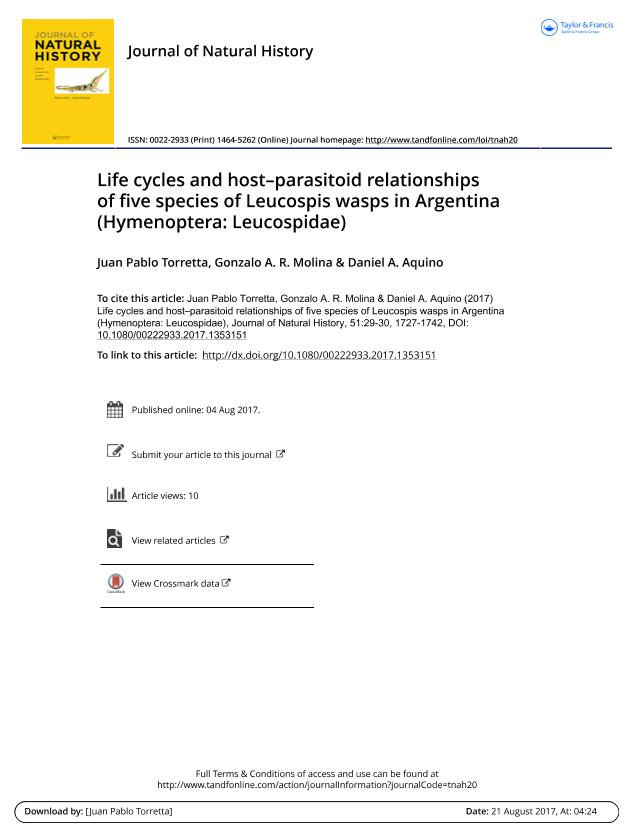Artículo
Life cycles and host-parasitoid relationships of five species of Leucospis wasps in Argentina (Hymenoptera: Leucospidae)
Fecha de publicación:
08/2017
Editorial:
Taylor & Francis
Revista:
Journal of Natural History
ISSN:
0022-2933
Idioma:
Inglés
Tipo de recurso:
Artículo publicado
Clasificación temática:
Resumen
The genus Leucospis Fabricius is comprised of parasitoid wasps relatively uncommon in nature. Their immature stages develop on aculeate Hymenoptera, in particular solitary bees, but hosts are known for only around 25 Leucospis species (about 20% of 115–120 world species), so the true relationship of this family with bees is largely unknown. Here we report on individuals of five species of Leucospis wasps which emerged from nests of different bee and wasp species during distinct sampling periods during a trap-nesting programme, in two contrasting areas: agro-ecosystems and natural habitats in the Pampean region. Some of these nests were parasitised by L. cayennensis Westwood, L. coxalis Kirby, L. egaia Walker, L. pulchriceps Cameron and L. signifera Bouček. Our results expand the available information of host species for L. cayennensis, L. coxalis, L. egaia and L. pulchriceps and represent the first record of hosts associated with L. signifera. The hosts were only bee species of the genera Centris, Tetrapedia (family Apidae) and Megachile (Megachilidae). These species were more abundant in the natural reserve than in agro-ecosystems, suggesting that anthropogenic activities could negatively affect their populations. Most nests were attacked in one (43.7%) or two (40.7%) cells, but the remaining nests (16.5%) had more (up to seven cells). However, the position of the attacked cells was variable, suggesting that females of Leucospis species oviposit in recently built cells, and that the hatching of larvae is delayed, or that the first larval stage waits until the host larva reaches a sufficient size to attack.
Palabras clave:
Apidae
,
Biology
,
Centris
,
Megachile
,
Megachilidae
,
Parasitoid Behaviour
,
Tetrapedia
Archivos asociados
Licencia
Identificadores
Colecciones
Articulos(OCA PQUE. CENTENARIO)
Articulos de OFICINA DE COORDINACION ADMINISTRATIVA PQUE. CENTENARIO
Articulos de OFICINA DE COORDINACION ADMINISTRATIVA PQUE. CENTENARIO
Citación
Torretta, Juan Pablo; Molina, Gonzalo Alberto Roman; Aquino, Daniel Alejandro; Life cycles and host-parasitoid relationships of five species of Leucospis wasps in Argentina (Hymenoptera: Leucospidae); Taylor & Francis; Journal of Natural History; 51; 29-30; 8-2017; 1727-1742
Compartir
Altmétricas




